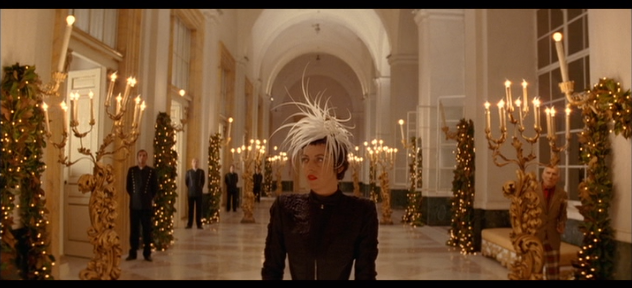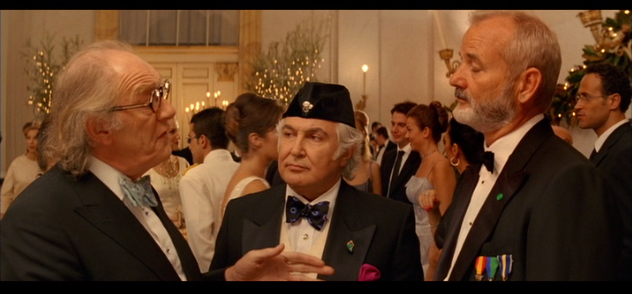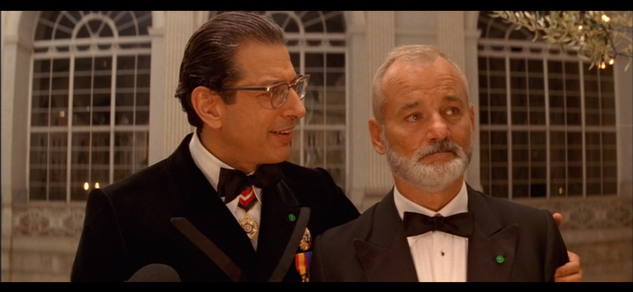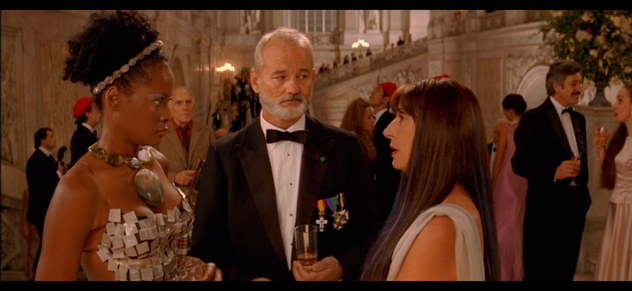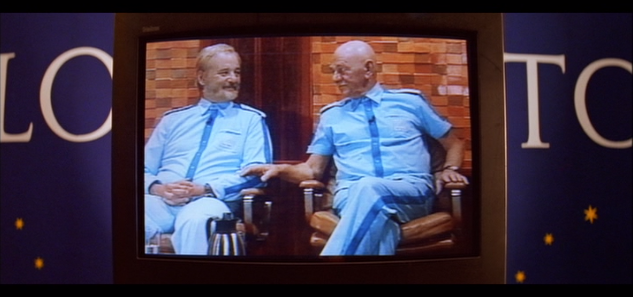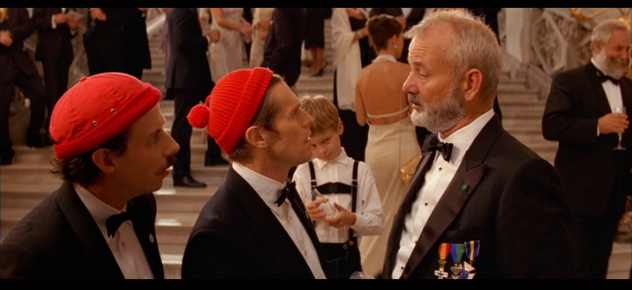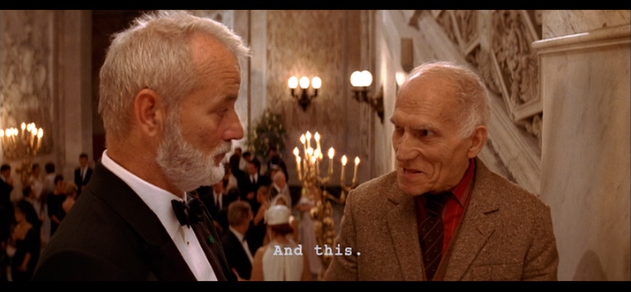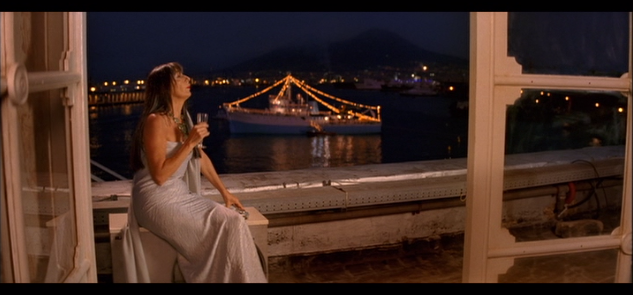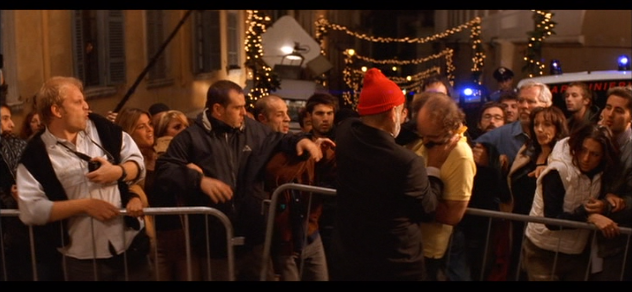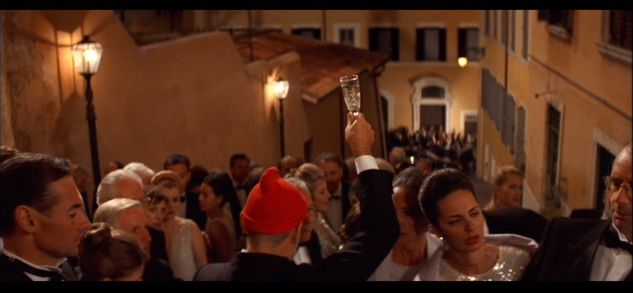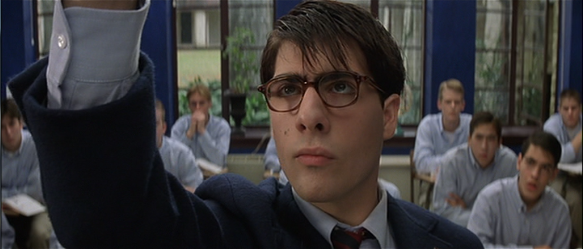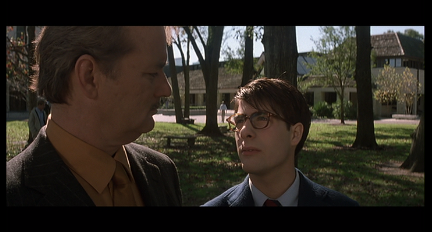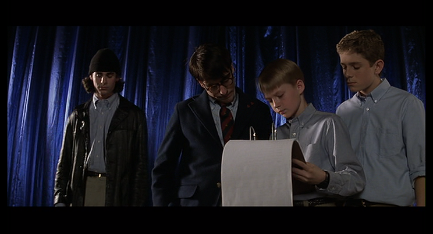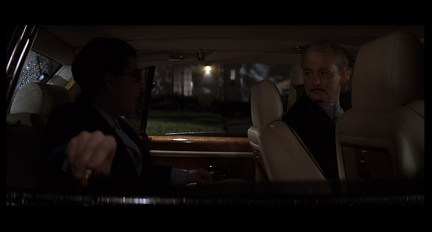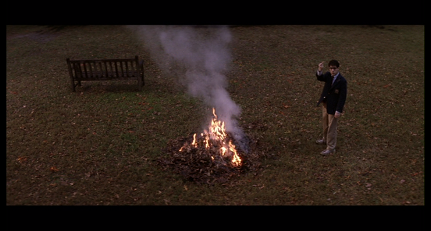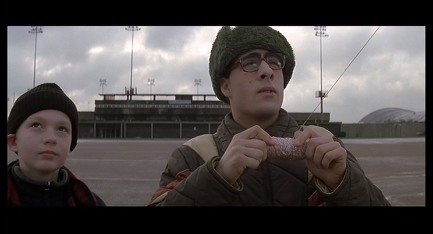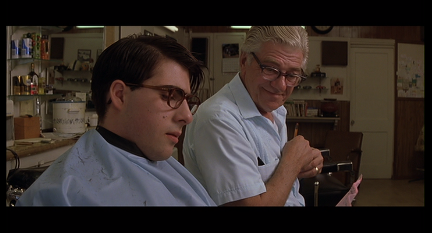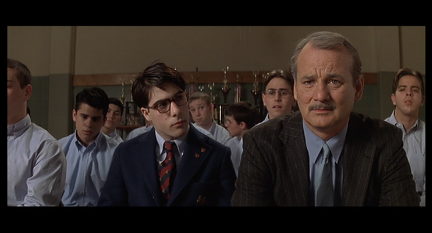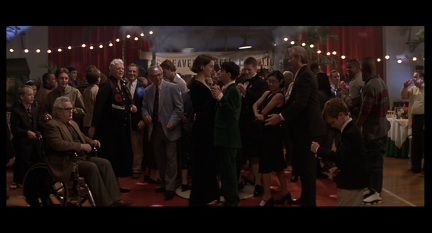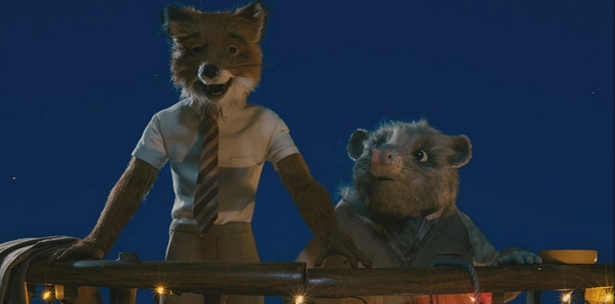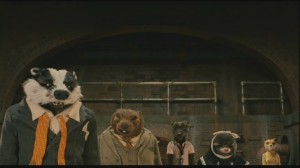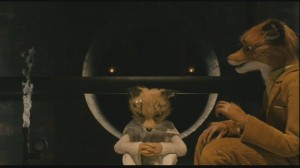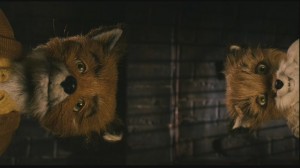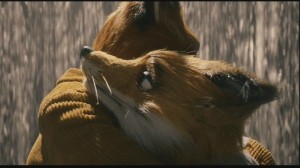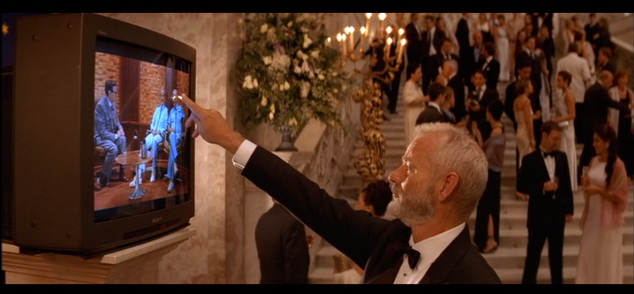
The Life Aquatic With Steve Zissou is a strange film. It’s about family, it’s about celebrity, it’s about revenge, and it’s — arguably primarily — about the relentless intrusion of reality into a life carefully cultivated. It’s many things throughout the course of its runtime, and it’s never less than two distinct things at once. It is, I would argue, one of Anderson’s densest films, and it’s also my personal favorite, making it a perfect candidate for my first installment of Anatomy of a Scene.
Originally I wanted to do the Maddox Hill Cemetery scene from The Royal Tenenbaums — and there’s no reason I can’t do that later — but for the time being I think it got a fair enough bit of attention in my 10 Most Affecting Wes Anderson Moments feature. Instead I’m turning to the Loquasto International Film Festival scene from The Life Aquatic With Steve Zissou. It’s a very early sequence in the film that really shows Anderson — and Mothersbaugh, and Murray — at their indirect best. Every line and detail hearkens forward to what’s to come, making it a brilliantly constructed overture of sorts, and yet, viewed out of context, it functions perfectly well as a piece of work unto itself, standing alone as a series of emotional triggers for one man who is having a terrible night…and being required to suffer in public.
Celebrity oceanographer / documentarian Steve Zissou has just premiered his latest and most tragic film to an audience that responds with a distinct lack of interest. Steve emerges from a post-screening Q&A session that has gone no better, and that’s where the scene begins. We open on a vast and relatively empty hall, where Antonia Cook (played by the late Isabella Blow) is standing stock-still and dead center, waiting for Steve to come through the door so that she can compliment him on his film — which we can pretty safely assume she wasn’t in the room to see. She’s more interested in awaiting her chance to flank a celebrity than she is in actually watching the films that made him famous in the first place. It’s a sort of only-half-aware posturing, an appreciation of celebrity without consideration for actual merit, that Steve himself suffers from as well.
In the background we can also see the old man who will later ask Steve for his autograph; he can actually be glimpsed several times throughout this sequence before he gets his moment, suggesting that Steve has overlooked him, and, indeed, overlooks as many people as he can afford to, preferring isolation even during this grand event. When the old man eventually does get his chance, he needs to be introduced by Vladimir Wolodarsky, Team Zissou’s physicist / original score composer. As we’ll see later in the film, it really is up to Team Zissou to keep their captain grounded, and rooted to the world beneath him…if not exactly to reality.
The name “Loquasto International Film Festival” is also loaded, making oblique reference to Santo Loquasto, a famous production designer who worked on more than 60 Broadway shows, as well as many Woody Allen films — netting him several Academy Awards for his work with that great director. In short, it’s a film festival named for a production designer rather than a director, a writer, or an actor. It passively highlights the importance of design, of construction, of careful assembly…over, say, quality. That’s Steve Zissou’s world in a nutshell.
After Antonia, Steve meets with Oseary Drakoulias, head of the financially-questionable production company that publishes his films. Oseary is speaking with Larry Amin, ostensibly casually, but as Steve correctly intuits, Oseary is both flirting with Amin and angling for money. In more controlled circumstances, Steve might shake hands and move along, but after having to field questions about his closest friend’s death he’s not interested in glad-handing. Oseary immediately berates Steve for his insensitive — though accurate — response to the situation, and this berating doesn’t seem to affect Steve at all. He’s feeling as low as he’s ever been, with Esteban’s death just the latest addition to a massive stack of tragedies he’s never gotten around to dealing with.
We should take a moment to talk about the score before we get too far ahead, and feel free to listen to it in isolation from the scene. It’s a genuine Mothersbaugh masterpiece, holding true to its main theme but allowing itself to drift away periodically, before a crash of strings to pulls it back down to Earth. This piece of music is similar in that regard to Mothersbaugh’s “Sonata for Cello & Piano in F Minor” from The Royal Tenenbaums, and this scene serves a similar purpose to that one in Anderson’s previous film as well. Both scenes show us where the characters are now, in present day, plying us with the basic information we’ll need in order to interpret everything that comes next.
I’d argue that both this scene and this piece of music represent a step forward in artistic merit, however, as the earlier scene relied on narrator Alec Baldwin to keep us focused and attentive to the right details, whereas this scene dumps us disoriented into the great hall, just as Steve is dumped, and requires us to make our way, without assistance, through the onslaught of characters, dynamics, and emotions on display. The score, likewise, has a more organic momentum to its digressions than “Sonata,” what with its abrupt drum solos and reggae breaks.
Steve’s next stop is a photo op with his “nemesis,” Alistair Hennessey (played with gleeful condescension by Jeff Goldblum). Hennessey is, as the film will both now and later prove, exactly what Steve is not: collected, well organized, efficient, and flush with cash. He also used to be married to Eleanor Zissou, Steve’s wife. We see the differences immediately upon Hennessey’s arrival in this scene: he’s smiling, he’s shaking hands, and he’s thronged by reporters. He’s in his element — unlike Steve, who is quite clearly a fish out of water…so to speak… — and this is what he lives for. He’s also — it’s important to note — clutching an award.
He makes friendly overtures toward Steve — even though they’re at least passively adversarial. He repeatedly opens the door to conversation and attempts to engage Steve while the cameras flash all around them, but Steve won’t so much as look at him or smile for the photographers. In fact, Steve doesn’t smile once throughout this entire long scene, slipping instead to varying depths of desperation and dissatisfaction. And that’s the difference between Steve and Hennessey: Hennessey is satisfied with who — and where — he is. He can afford to humorously prod Steve about his film, both because he’s happy with who he is, and because he knows Steve is not. These are two old hands in the same industry, but Steve won’t even give Hennessey a straight answer when he asks the simple — and valid — question of whether or not the jaguar shark even exists.
It’s also worth drawing attention to the Christmas decorations, which sporadically populate the hall. While The Life Aquatic contains no explicit references to Christmas, it does, in several ways, have Christmas in its blood. For starters, it was released in theaters on Christmas Day in 2004. It stars Bill Murray, who can number among his most famous films Scrooged, which is a humorous adaptation of A Christmas Carol. The Life Aquatic also deliberately echoes one of the most famous images in A Christmas Carol by ending the film with Steve hoisting Klaus’s nephew onto his shoulders like Tiny Tim. In fact, the entire sequence at the Loquasto International Film Festival functions in a thematically similar way to the first phase of Scrooge’s rehabilitation: uncomfortable — and unwilling — exposure to the ghosts of the past. In fact, I’ve long wanted to write an essay about The Life Aquatic functioning as an oblique adaptation of A Christmas Carol, but that’s a project for another time…
Next we meet Steve’s wife, Eleanor Zissou. As we’ll learn shortly, she is “the brains behind Team Zissou.” This is important to note, because it explains why he remains in a relationship with her. The two have a mutual dislike for each other that is only infrequently overcome by whatever tenderness survives between them, but she has the money that Steve needs to keep shooting, as well as knowing “the Latin names of all the fish and everything.”
It’s less clear why Eleanor stays with him, though. Steve is quick to point out that Hennessey isn’t much of a threat to their marriage as, in spite of his history with Eleanor, his homosexual tendencies keep him otherwise engaged. Beyond that, though, there’s less incentive for Eleanor to stay married to Steve than for Steve to stay married to Eleanor.
Once Eleanor steps away, Steve is approached by a woman — in attire suitable for a mermaid — who wishes to say hello. Steve leans in to kiss her, but she does not want to be touched by him. (It’s pretty easy to insert the word “anymore” here.) When Eleanor returns he attempts to introduce them, but Eleanor cuts him off by asking if he really wants to put her through this, resulting in both women leaving him in separate directions. Steve, alone, pops a pill.
It’s a loaded moment in many ways, and while we never see the woman again, Steve’s womanizing is absolutely to the fore several times in the future. Here it threatens his relationship with his wife, and before long it will threaten his relationship with his son.
As with everybody tonight, Steve is being exceptionally candid, confessing to Eleanor that he’s “right on the edge,” and that he doesn’t know what comes next. When both women abandon him and he swallows a pill, it’s clear that he does, in fact, know what comes next…he just really wishes he didn’t.
When I said earlier that Steve doesn’t smile in this scene, I was incorrect. I should have said that present-day Steve doesn’t smile in this scene, as we do see some archival footage of an early interview on the film festival’s monitors, presenting a blonde and happier Steve from better times.
The interviewer, Antonio Monda (an interestingly similar name to Antonia Cook’s), asks what Steve is to Team Zissou. Steve chuckles, but is clearly enough at a loss for a reply. Esteban places a hand on him and says, “He’s the Zissou.”
It’s exactly the kind of response that could be interpreted either way, but from Esteban, Steve hears it as a compliment. What is Steve? Esteban’s reply could suggest either that he’s everything to the team — in fact, is the team — or that he’s nothing but a name. Steve interprets it — correctly, I feel — as meaning the former. From Hennessey, it would have been the latter.
But there is no more Esteban. He’s been taken from this world and from Team Zissou by the jaguar shark and Steve’s negligence, and Steve it’s Hennessey who’s here instead. So what, now, is Steve? It’s a question our central character is going to have a lot of trouble answering over the course of them film, and it’s one to which he will go to great lengths in order avoid answering at all.
He reaches out to Esteban and a tiny spark flashes at his fingertip. Bright, urgent…and then gone. A metaphor for both Esteban himself, and also Steve’s celebrity.
Next we meet Klaus (Willem Dafoe), who introduces Steve to his nephew. His nephew has a gift for Steve…a crayon ponyfish. It’s unlikely to be anything Steve hasn’t seen before, and it’s less likely to be anything particularly impressive — the plastic bag suggesting that Werner saved his allowance and purchased it from a pet store — but it’s a tangible reminder of Steve’s youthful ambitions. It’s an image out of his own past, an infatuation with the sea and with those who explore it. Every creature is magical, if you view it through the right lens, which in this case is the innocence of youth.
This is why Anderson created all of his sea creatures from scratch, using stop motion rather than actual, living beings. Everything is invented, and therefore everything is new to us. They need to be, so that they can stand out as magical, and not mundane. Steve’s tired and careless approach to the wondrous worlds that unfold regularly around him is a symptom of a professional and personal malaise…not any shortness of majesty in those worlds themselves. Fresh eyes like Werner’s — and implicitly ours — can still see that. Steve’s eyes are tired, but we see a flash, ever so fleeting, of admiration for the boy who admires him in return…a memory of a simpler time, when Steve really cared about what he was doing.
This is also the first time we see Steve interact with other members of Team Zissou, who, as we saw earlier in the film, don’t particularly have much experience with the sea. Their titles are telling…Steve lists camera men, sound men and script girls, but his crew is tellingly free of oceanographers and marine biologists. Instead, Steve surrounds himself with a crew that can insulate him, artificially, from the world around him. Rather than exploring and discovering the unknown, Steve prefers a life determined by scripts, lighting levels, and carefully managed interactions. He’s comfortable only when he doesn’t have to deal with the unforeseen, but it didn’t used to be this way.
This lack of comfort is on display when he’s finally confronted by the old man in pajamas, who has come to the film festival with a stack of posters advertising Steve’s previous movies. He seeks out an autograph and at first Steve is willing to comply.
Eventually, however, Steve tells him to leave. There are too many posters to sign, and this affects Steve in precisely the opposite way that his encounter with Werner affected him moments before. (“I could go either way” is a very telling line…and, in fact, he ends up going both ways. First one, and then the other.) Here, Steve is confronted with evidence of his past. Not an idealistic reminder as he saw in Werner, but a physical, unchangeable record of what he’s actually done. The films advertised on these posters don’t strike one as being particularly good, as some of them have only the most tenuous connections to the sea at all. The old man may be a genuine fan, or he might just be a collector. Either way, he’s handed Steve a record of his professional — and progressing — degradation, and then asked him to account for every one.
It’s a disappointment that frustrates Steve and brings him immediately back down from the relative high of Werner’s gift. Meanwhile, we can imagine Klaus being particularly happy that things went so well with Steve and his nephew. As morbid as it might seem, Klaus is clearly expecting a battlefield promotion. Esteban is dead, and that’s tragic…but it also leaves a vacancy for Steve’s right hand man. Klaus has been a long-suffering and fragile member of Team Zissou, who thought of both Steve and Esteban as fathers to him. This next voyage will be his chance to step up and impress his father figure…unfortunately, this next voyage will also feature the return of Steve’s prodigal — if not necessarily actual — son Ned, which relegates Klaus again to the sidelines, and sinks him immediately into the depths of aggressive misery.
For now, however, Klaus can look forward to the future…as Steve seeks desperately to isolate himself from the past.
As Steve’s long, dark, wine and cheese party of the soul winds down, he finds a welcome quiet moment as he gazes longingly in Eleanor’s direction. Of course, he’s also gazing off at the Belafonte, his ship, where his life has structure, if not necessarily meaning. It’s a place where he can be safe (where, indeed, he employs a Safety Expert)…it’s the ability to set sail, and leave everything — absolutely everything — in the world behind.
For Anderson, it’s no coincidence that Eleanor is in that shot as well. After all, she’s what keeps Team Zissou afloat. He needs her, whether or not he likes her. In a remarkable bit of restrained cinematography, we linger for a short while on this view, and then return to a very long shot of Steve, silent and unmoving. He ends up being either too intimidated or too disinterested — or both — to approach his wife and speak to her, so he settles instead for raising his hand in a brief, motionless wave.
It’s impossible not to see this as well as the universal gesture for “stop.”
There’s a beautiful swell in Mothersbaugh’s score, and Steve comes back to Earth.
Steve’s night isn’t over yet, however, as there’s one last obstacle between him and the yearned-for safety of his boat: the crowd. Steve has no interest in any of them, any moreso than he had in the old man earlier, but one person gets his attention by suggesting loudly that Steve should be in mourning for Esteban…and then asking who he intends to kill in part two.
This is Steve’s collapse, as the weight of the evening and every conflicting emotion he’s had all night surge to his head, and he attacks the man physically.
It’s interesting that Steve doesn’t snap until after the man takes his picture (an aural “snap” itself), thus recording, yet again, another failure of Steve’s. As a celebrity, Steve must cope with his mistakes in public. He’s recognizable and famous, and as such doesn’t have the luxury of coming to terms with his shortcomings and failures in solitude.
It’s interesting that in Rushmore, Bill Murray’s character also seeks refuge beneath the waterline. It’s a chance to separate, a chance to be of the world and yet also free from it. Here he must face his failings head-on, and he responds to them by lashing out.
We also see Team Zissou come to his aid not by stopping Steve or pulling him out of the fray, but by hopping the barricade and assaulting the heckler themselves. They serve as a wall — in this case literally — between Steve and the consequences of his actions. Their job is to keep their captain safe — physically, mentally, emotionally, howsoever necessary at any given time — which is why he has come to rely on them more than he’d ever be able to rely on a group of competent oceanographers.
In the scuffle, the bag containing Steve’s crayon ponyfish is ruptured. While Steve would have no trouble replacing it and indeed sees more remarkable things daily, he takes a champagne glass from another partygoer and rescues the ponyfish with it, hoisting it above his head like a banner as he walks away.
But it’s not just the ponyfish he rescued — as Steve’s made clearly known, he’s not sentimental enough about sea-life to keep from killing it for personal reasons — it’s Werner’s idealism. It’s youth. It’s a message from the past, one of many he received tonight but the only one he can bear to hold onto. It’s a reminder maybe not of what Steve Zissou is but at least of why Steve Zissou is.
It’s also a small creature. Like Werner. And like Steve was once, too. It’s a creature unable to survive in the environment around him, which requires itself to be kept safe and secure until it can return to its home in the sea. Steve understands.
